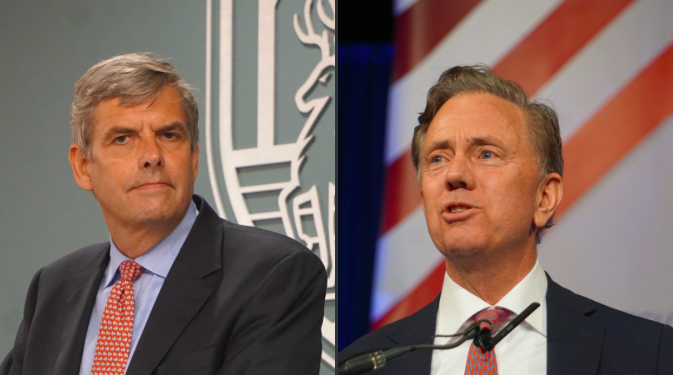New Chapter in Governor’s Race Opens Wednesday

Audio By Carbonatix

Gubernatorial candidates Bob Stefanowski (left) and Ned Lamont. Courtesy of CTMirror.org.
Republican gubernatorial candidate Bob Stefanowski will engage in his first debate with Democratic candidate Ned Lamont on Wednesday.
By Mark Pazniokas, CTMirror.org
The first opportunity for side-by-side comparisons of Democrat Ned Lamont and Republican Bob Stefanowski, each a businessman trying to become Connecticut’s next governor without significant government experience, will come Wednesday night on the stage of a 1920s movie palace enjoying a second life as a performing arts center.
Lamont, 64, will make his entrance at the Garde Arts Center in New London in his third try for statewide office, the loser of a general election for U.S. Senate in 2006 and a Democratic primary for governor in 2010. Stefanowski, 56, is the ultimate political outsider, a first-time office seeker who cast no vote for president or governor in more than a decade.
Every debate is theater, but more so at the Garde, a 1450-seat seat house where 600 seats are distributed through the campaigns, giving the debate a raucous energy missing from confrontations in broadcast studios or smaller venues. It is organized by The Day and WTNH and will be televised at 7 p.m. on WCTX, MyTV9.
Debates are a campaign within a campaign, an unscripted hour set against the tightly plotted world of 30-second television commercials and digital ads. They are contests that rarely are won, but can be lost. A major gaffe or flat performance can ripple from the Garde, shared by live and television audiences, framed by campaigns and surrogates, and amplified by the media.
“Narratives do start somewhere,” said Roy Occhiogrosso, a Democratic consultant. “They don’t start with the general public.”
Lamont and Oz Griebel, an independent candidate, debated tax policy and economic issues last week without Stefanowski. Griebel, with support from only 4 percent of voters in a recent poll, is not invited to New London. The two major-party candidates are currently scheduled to debate five times, the first on Wednesday and the last on Oct. 30.
The risks and rewards of the first meeting are potentially higher for Stefanowski, a former high-ranking corporate executive who grew up in New Haven and North Haven, but spent long stretches of his career in global finance overseas and is new to Connecticut politics.
He won a five-way GOP primary in August with 29 percent of the vote. A recent poll found that 40 percent of unaffiliated voters, the largest and likely most persuadable block of Connecticut voters, have no opinion of him, while 32 percent had no opinion of Lamont.
“Especially when you are running for statewide office for the first time, this is how you introduce yourself to the people of Connecticut,” said Timothy Herbst, who finished fourth in the five-way Republican primary. “You want to make sure people are comfortable with you. They have to be comfortable with you as a person before they can be comfortable with you as a leader.”
Herbst is playing Lamont in debate rehearsals with Stefanowski. During Republican debates, Herbst was most aggressive in challenging Stefanowski to explain how he could realistically deliver his central promise: Eliminating the income tax, the source of half the state’s revenue, over eight years.
About half of voters say they favor eliminating the tax, but only 35 percent see it as realistic, according to a Quinnipiac University poll.
“I think they’ll be very curious about Bob,” Lamont said. “They know he wants to eliminate the income tax, but they don’t know anything else about how he plans to pay for it, what that means in terms of property taxes, what that means for education. So, I hope a debate is a chance to get some specifics out of both of us.”
Stefanowski, the first candidate on television with a commercial in January, sees it differently.
“I’ve been consistent from the start. Whether you liked it or not, from day one, I said I’m going to get rid of this income tax, I’m going to lower regulation,” Stefanowski said. “I’ve seen a lot of inconsistencies in Ned’s positions. I don’t know whether he’s for increasing taxes or lowering them. We’ve got him on tape saying he’s going to introduce an auto tax. Now he said he was misinformed.”
Lamont’s advertising has sought to sow skepticism about Stefanowski’s plan, asserting that eliminating half of the state’s tax base would be disastrous, shifting costs to local government and property taxes. More than 15 percent of state spending – $3.2 billion of a $20 billion annual budget – goes to municipal aid.
Advertising by Stefanowski and a super PAC financed by the Republican Governors Association portrays Lamont as another version of Gov. Dannel P. Malloy, the unpopular incumbent who is not seeking re-election. One ad features Lamont, challenged on a radio show to give a yes or no answer to whether he would raise taxes. He replied, “Yes.”
In the debate last week, Lamont said he was referring to electronic tolling. Lamont has called for tolls on tractor trailers, following a Rhode Island policy that is now being challenged in federal court as discriminatory and in violation of the Commerce Clause of the U.S. Constitution.
Neither candidate has addressed a more immediate challenge: How to close a projected shortfall of about $2 billion shortfall in the coming fiscal year.
Campaign debates are less about winning arguments than creating impressions as summer wanes and more voters engage, which is especially true in a campaign with no incumbent, said Attorney General George Jepsen, a former Democratic state chairman.
“Seldom are they game changers. And when they are game changers, it’s usually because a candidate makes a major gaffe,” Jepsen said. But over the course of five debates, the candidates will make an impression in ways that scripted ads cannot, he said.
“You have to prosecute your case — why you should win and your opponent should lose,” said Herbst, whom Stefanowski viewed as the strongest debater in the GOP field. “Elections are about choices. Elections are about contrasts. In the absence of contrasts, there is not a choice.”
Reprinted with permission of The Connecticut Mirror. The author can be reached at [email protected].
Like what you see here? Click here to subscribe to We-Ha’s newsletter so you’ll always be in the know about what’s happening in West Hartford!



